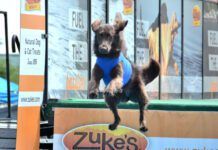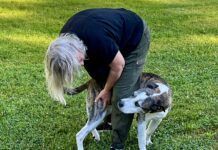A couple of weeks ago I wrote about a story that had been widely shared on social media about mixed breed dog DNA tests. The story had been generated by a Canadian news organization, which had conducted an investigation into the tests, by submitting DNA from three dogs and one human to four companies offering these tests. The results were widely reported as being crazily false – and the results from two of the vendors were bananas, but there were actually pretty good results from the two leading vendors of these tests (Wisdom Panel and Embark), with the latter’s results being, as far as I was concerned, spot-on!
Neither the Canadian news station nor I mentioned the only nonprofit purveyor of mixed-breed DNA tests. Today I’m trying to correct that, as well as promote their services for entirely selfish reasons.
Darwin’s Ark is a nonprofit scientific research project that offers mixed-breed dog breed identification tests – but, more seriously, the project is using dog DNA in order to find answers to common health and behavioral issues in dogs, with implications for human health and medicine. It’s the brainchild of geneticist Elinor K. Karlsson, a professor of Bioinformatics and Integrative Biology at the University of Massachusetts Chan Medical School, and the Director of Vertebrate Genomics at the Broad Institute of Harvard and MIT. Karlsson’s current projects include the Zoonomia Project, an international effort led by the Vertebrate Genomics group at the Broad Institute to compare hundreds of different mammalian genomes and identify critically important segments of DNA. She is also studying recent human evolution to find the genetic variation that makes some people resistant to ancient infectious diseases, like cholera.
Karlsson has a special interest in diseases shared between humans and dogs. She leads the citizen science-driven Darwin’s Dogs project, which invites dog owners to participate directly in research exploring the genetic basis of dog behavior, as well as diseases such as OCD and cancer.
There’s a very good article about Karlsson’s work here, written by sometime WDJ contributor Jessica Hekman, DVM, who studies the genomics of dog behavior at the University of Illinois, Urbana, and who is a post-doctoral associate who works on the Darwin’s Dogs project.
Darwin’s Ark is collecting DNA samples from as many dogs as they can get their hands on, and the DNA will be available for use by all the Darwin’s Ark researchers in any of the fascinating and meaningful studies they are conducting. One focuses on working dogs: assistance dogs, military dogs, SAR dogs, bomb detection dogs and more. The Darwin’s Ark website describes, “Our goal is to find genetic markers for the behavioral traits that make successful military and working dogs. By using new genetic technology, and working closely with dog breeders and trainers, we want to be able to select the right dog for the right job.”
They also have a cancer study in progress. “By studying cancer in dogs, we’re working to help both people and dogs survive cancer. Dogs get many different types of cancer, and many of these cancers look and behave like human cancers. Canine cancers are also treated with many of the same drugs and other treatments that humans receive. Additionally, some cancers that are very rare in people are more common and easier to study in dogs. Together, we’ll be learning more about why dogs get cancer and the best ways to help them. We plan to study risk factors passed down from parents to puppies, test methods to detect cancer in a blood sample, and compare exposures to potential cancer risk factors in each dog’s home and surrounding areas.”
All canine DNA submitted to Darwin’s Ark – including that submitted in search of identifying the breeds in a mixed-breed dog – will go into a pool of data that can be accessed by the scientists working with Darwin’s Ark, for strictly noncommercial purposes. Darwin’s Ark makes a big point that this is all open science: “We are a non-profit that subscribes to the open science model. This means we do not own and will never sell your pet’s data. You contribute to an open source database and we share all the new discoveries we find freely with you and researchers around the world. Together we can advance health care for pets and their humans.”
You can participate in Darwin’s Ark’s research by submitting your dog’s DNA to Darwin’s Ark for free; they just ask you to answer a number of surveys about your dog’s health and behavior. Once you’re answered 10 surveys, Darwin’s Ark will ship a DNA collection kit to you for free. Once returned, they sequence the DNA from the saliva and send you genetic and ancestry information about your pet – but the timetable for receiving these results for free depends entirely on the funding Darwin’s Ark receives as a result of its constant grant-writing. If you submit information about your dog and return the DNA collection kit that you requested for free, it may take years for you to receive any answers.
However, Darwin’s Ark now offers a paid service that will return the results of a mixed-breed identification test to you on a more prompt schedule. Yippee! For $149, Darwin’s Ark will send you a DNA collection kit that you return in a postage-paid envelope – and you’ll receive the results faster. . . but since this is not a commercial enterprise, the timetable of your results will depend on the number of paid samples they receive. Darwin’s Ark doesn’t run DNA tests on individual dogs, but will run the tests any time they have a batch of 20 paid-for DNA samples.
We’re finally at that place of self-interest that I mentioned earlier.

As I mentioned in the previous blog post about mixed-breed dog identification tests, I had DNA for my dogs Woody and Otto analyzed by both Embark and Wisdom Panel, and have shared the very similar results. I also sent DNA from my youngest dog, Boone, to Wisdom Panel. A few weeks ago, I submitted Boone’s DNA to Embark and to the paid service offered by Darwin’s Ark. I’ll share the results of those tests when I receive them, but as I learned when I checked with Darwin’s Ark, to see when I might expect results from them, their results will arrive promptly after they have received a total of 20 paid tests and run them as a batch.
If you’re interested in getting a mixed-breed dog identification test done on your dog – especially if you’re interested in science and would love to contribute to open-source science involving dogs and being conducted by scientists all over the world – consider getting a paid DNA test from Darwin’s Ark! You can read more about how to order the tests and what Darwin’s Ark is doing with its data here. And when Darwin’s Ark sends me results on Boone’s DNA, I’ll share that with you – and would be happy to also share any results you receive from your dogs that you send us. It would be fun!
Darwin’s Ark explains the difference between the methodology of how its tests are run versus the how the commercial labs get their results; it sounds like Darwin’s results will be much more complete than those offered by Embark and Wisdom Panel. According to the Darwin’s Ark website, “We generate about 9,000,000 markers for each dog for our research. Our breed ancestry panel currently uses 688,060 of those markers. We are limited in the number of markers we can use for breed ancestry, because the algorithm we use requires that every dog in our breed panel have the same number of markers.”
For comparison, this information is from the Embark website: “Embark is the only canine genetics company that uses a research-grade genotyping technology. The Embark dog DNA test is based on the Illumina CanineHD microarray, which has long been the leading research platform for dog genetics. Our dog DNA test analyzes 230,000 genetic markers. That’s more than twice as much genetic data as the competition.”
I am eager to learn more and compare the results for my dog from Wisdom Panel, Embark, and now Darwin’s Ark. Are you, too?






Thanks for including this. I had my pup’s DNA done through Darwin’s Ark, and I paid for it too. It did take a bit longer than friends using Embark on their rescue pups, but I love the work they do and love that we are contributing to research! And it turns out that the results are similar to what came back from Embark on the DNA of my pups siblings. I also filled out all of the surveys -26 in all- and it reminds me of those I take with for my own DNA with 23 and Me. Anyway, can’t wait to see your results too…
You said they are studying cancer in dogs? I lost my min dachshund January 2023 to lung cancer.
I don’t know if the vet’s office would still have the information they would need but I would be happy to give permission for the office to speak with them.
I had Kelce’s DNA done through both Wisdom and Embark. Wisdom listed 11 breeds and their percentages, and cleared him of 209 genetic health predispositions linked to those breeds. Embark listed only 4 breeds, with similar percentages, and lumped together the remaining 19.7%, calling it “Supermutt”, saying there MAY be small amounts of DNA from these distant ancestors, listing only 3 of the remaining 7 breeds from Wisdom. They listed a different health predisposition, saying the variant was low. I would be interested in having Kelce tested again through Darwin’s Ark.